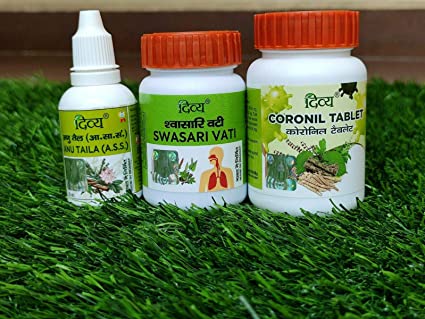- July 1, 2021
- Posted by: Maestro Legal
- Categories:


By Ayushi Tyagi
INTRODUCTION
Recently, there has been a trademark dispute between two corporations and the matter reached the Madras High Court. The suit was filed by M/s.Arudra Engineers Private Limited, Chennai, is a chemical cleaning company that also manufactures Material Handling Systems and Polymeric Epoxies for many enterprises in India and internationally, alleging trademark infringement againstthe defendants (M/s. PatanjaliAyurved Limited, New Delhi and Divya Yog Mandir Trust, Haridwar, Uttarakhand). The learned Single Judge of Madras High Court passed judgment in favour of plaintiff [1]which was challenged by the defendants before division bench of Madras High Court, and the Division bench has set aside the judgment of the Single judge bench. [2]
FACTS
- The plaintiff CORONIL-92 B” and “CORONIL-213 SPL,” is the registered owner of the trademarks ” which have been in use since 14.06.1993 for “Acid inhibitor for industrial cleaning, chemical preparations for industrial use” under Class 1 under Registration Nos. 599279 and599281, respectively, with valid and subsisting registrations through 14th June 2027.
- The defendant initially launched the much-discussed ‘CORONIL’ tablets for curing coronavirus, but after a public outcry over the mark as it was launched prematurely, claiming to provide an absolute cure without conducting the required human trials in the first place, relaunched it as an immunity booster to prevent cold and cough.
- The plaintiff learned via newspapers in June 2020 that the defendants were marketing their medication as a treatment for the Corona Virus using a mark that was identical to the plaintiff’s registered trademark ‘Coronil.’
- The Divya Yog Mandir Trust (second appellant herein) filed T.M.Application No.4534424 in the Delhi Trade Mark Office on 16.06.2020 for a trade mark for the word “Coronil Tablet” in Class 5.
- The Plaintiff filed a suit for infringement of Trade Mark against the M/s. PatanjaliAyurved Limited, New Delhi and Divya Yog Mandir Trust, Haridwar, Uttarakhand.
- and herbal preparations” was filed on a proposed to be used basis on 16/06/2020 under Class 5 in the name of Divya Yog Mandir Trust.
- The learned Single Judge Bench of Madras High Court granted an interim injunction order on 17.07.2020, restraining defendants from usingthe mark CORONIL for tablets to prevent Covid-19 infection.
- In its judgement dated 06.08.2020, a single-judge bench of Justice C.V. Karthikeyan upheld its initial interim injunction, which had already been granted in favour of the Plaintiff, and thus made it further absolute restraining the Defendants from using an identical mark “Coronil” and imposed costs to the tune of Rupees Ten Lac to be jointly paid by the Defendants.
- The defendants challenged the judgment dated 06.08.2020 of the Single-JudgeBench of Madras High Court before Division Bench of Madras High Court.
- The SC refused to entertain the petition challenging the Madras High Court’s decision to stay a single judge ruling prohibiting PatanjaliAyurved Ltd from using the trademark “Coronil”.
ISSUES
- Is the word ‘coronil’ in the plaintiffs’ trademark protected under S29(4) of the Trade Marks Act, 1999?
- Whether the defendants’ use of the word “Coronil” infringed on the plaintiff’s registered trademark under the Trade Marks Act of 1999?
ARGUMENTS
RESPONDENT/PLAINTIFF
- The plaintiff contended that the defendants’ use of the trade mark “Coronil” is identical to the plaintiff’s registered trade mark, although the defendants are in a different industry than the plaintiff’s product sold under the registered trade mark, the defendants have infringed on the plaintiff’s trade mark and can to irreparable harm to the plaintiff’s reputation.
- Under Section 29(4)(b) of the Trade Marks Act, 1999, the Defendant’s act constitutes infringement. The registered trade mark should be protected if it is used by someone who is not a registered proprietor for goods or services that are not similar to those for which the trade mark has been registered.
- The plaintiff also claimed that they have an reputation within the India as well as around the globe, hence the condition under S.29(4)[3] that the registered trade mark must have a reputation in India is also satisfied in the present case.
- The plaintiff additionally claims that the defendants’ actions do not fall within the scope of the requirements set forth in Section 30 of the Act, as the defendants are not using the plaintiff’s registered trade mark with honest industrial or commercial practises. The defendants have been profiting from the present pandemic by abusing the great mental and physical hardships that everyone in India is experiencing, regardless of socioeconomic status.
- The plaintiff further argued that the defendants were infringing on their trademark and diluting its distinctiveness, hence dilution and damage to the plaintiff’s worth, goodwill, reputation, statutory and intellectual rights, which are all in his favour.
- Counsel for the Respondent/Plaintiff argued that before the Registry, the Respondent/Plaintiff had disclaimed rights in the alpha numbers “92 B” and “213 SPL.” As a result, the Respondent/Plaintiff holds sole ownership of the remaining word, CORONIL. As a result, the Respondent/Plaintiff has the legal right to exercise their statutory rights under the Act.
- The plaintiff contended that the balance of convenience is in their favour, and a decision refusing to grant an injunction will entail irreparable loss, prejudice, and injury to the plaintiff. Therefore, the counsel for the respondent/plaintiff sought that the appeal be dismissed by confirming the ruling of the learned Single Judge.
APPELLANT/ DEFENDANT
- In the Appeal, Appellant /Defendant contended that the products offered by the plaintiff and defendant are completely different. Similarly, the plaintiff’s and defendants’ businesses are different in nature and style. It was also said that there is no resemblance between the Coronil pills sold by them and the chemical products offered by the plaintiff for sanitising and cleaning heavy industrial machinery and containment units at factories by any stretch of the imagination.
- Furthermore, the plaintiff’s products and the defendants’ “Coronil” tablet will not be classified in the same class. The plaintiff’s products are classified as Class I, while the defendants’ “Coronil” tablet, which is sold by Divya Pharmacy and marketed by them, is classified as Class 5.
- Also, it is usual in the world of pharmaceutical pharmaceuticals to name the drug after the disease/organ/medical ingredient utilised in the drug, for example, “Coronil” was called as an immune booster against the Corona Virus. As a result, the defendants justified the use of the trademark “Coronil” as a legitimate one, therefore no question of harm arises.
- There is no point of contact between the class of goods for which the plaintiff received a trade mark registration, the class of clients, and the market and mode of purchase of goods.
- The two marks have very different visual appearances and are associated with two separate products. The manner in which the plaintiff’s products and CORONIL Tablet offered by Divya Pharmacy, marketed by the defendants are entirely different and ordinary prudent man would not confuse between plaintiff and defendants’ product.
- The product was produced as an immunity booster for the benefit of the general population, who would be unable to profit from the immunity boosting tablets if the defendants were to receive an injunction.
JUDGEMENT
- Court observed,Section 29 (4) of the Trademarks Act, 1999 come into play, only when a trademark that is similar or identical to a registered trademark is used for goods or services that are not similar to the trademark that has already been registered.
- Court also noted in the present case, despite the fact, that the respondent’s/label plaintiff’s is registered as a trademark and includes the phrase “Coronil,” the appellants’/defendants’ use of the word “Coronil” was not identical to the respondent’s/registered plaintiff’s labels.
- Court also said that, the Respondent/Plaintiff cannot claim exclusive rights and monopoly on any component of the composite mark unless each element and/or part of the composite mark is the subject of a separate application or registration as required by Section 17 of the Act. Court said, only the complete trade mark, as registered, is protected, not only sections of the trade mark. In this instance, the Respondent/Plaintiff secured registration as a composite mark over the label with the words and alpha number CORONIL 92B and CORONIL 213 SPL, rather than as a word for “Coronil” as contemplated by Section 15 of the Act[4].
- The court observed in the light of the judgement of the Rhizome Distilleries Pvt. Ltd. vs. Union of India and others,[5] that plaintiff cannot claim protection for the single word “CORONIL”.
- When each part of a label mark can be individually registered, the court stated that it cannot be dissected and split up into its component pieces for the purpose of granting an injunction. It went on to say that if the Respondent/Plaintiff had gotten a registration for the word “CORONIL” or any other word that was identical to the words used by defendants’, the situation would have been different.
- Because the respondent/plaintiff did not establish a prima facie basis for interim relief, the balance of convenience did not favour the respondent/plaintiff in obtaining interim relief. For the same reason, the issue of satisfying the third limb for obtaining an interim injunction, namely irreparable loss, or injury to the respondent/plaintiff, is irrelevant.
- As a result of the foregoing findings and observations, the court concluded that the Respondent/Plaintiff had failed to establish a prima facie case required the interim relief under Section 29 (4) of the Act. As a result, the learned single judge’s order is reversed, and the appellants’/defendants’ costs are likewise subject to be set aside.
ANALYSIS
The judgement represents a significant addition to the field of trademark law.The Madras High Court has done an outstanding job compiling a collection of precedents on the findings under Section 11 (6) and Section 29(4) of the Trademarks Act, 1999, and has established a path for enhanced trademark jurisprudence awareness and understanding, as well as striking the correct balance in addressing the topic at hand, which was desperately needed to rekindle trademark law awareness in the country during these trying times.
In the present case Plaintiff has trademark of the words CORONIL-92 B” and “CORONIL-213 SPL,” and not of the word Coronil hence could not claim to have monopoly of a word of the word ‘Coronil’. Therefore, they failed to claim protection under Section 29(4) of the Trademark Act,1999. Also, while the Plaintiff’s mark’s repute may be a prima facie point in its favour, mere repute in India is not a criterion for applicability of the Section 29(4), the Trademark Act,1999. The Plaintiff must additionally show that the Defendant’s mark takes unfair advantage of or is harmful to the registered trademark’s distinctive character or renown without reasonable cause. But as court has observed that the industries in which appellant and respondent works are totally different and their mark’s design is also not similar, therefore no protection is there to plaintiff in the present case was given and the Hon’ble Division Bench of the Madras High Court overturned the judgement of the Single Judge bench of the Madras High Court.
[2]Patanjali Ayurveda Ltd. & Anr. v. Arudra Engineers Pvt. Ltd., O.S.A No. 169 of 2020, decision dated February 2,2021 by Madras High Court.
[3]Section 29, The Trade Marks Act, 1999
[4]Section 15,The Trade Marks Act, 1999.
[5]MANU/DE/2742/2009
Author is a fourth year law student at Amity University, Noida. Currently Working as Legal Intern in ML Summer Internship 2021 .
